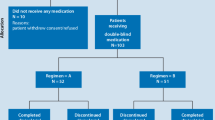Abstract
Purpose
Assessment of daily oral acetazolamide in treatment of refractory dysuria.
Methods
Forty-one patients were randomly allocated to either be treated with acetazolamide (250 mg twice daily) or to receive placebo. The irritative voiding symptoms and urinary pH were recorded before and after treatment. The quality of life indices including the impact of voiding symptoms on daily and social activities, mood disturbance and sleep disorders were also measured by a questionnaire.
Results
Urinary pH was increased in the group taking acetazolamide (P < 0.001). They also reported alleviation of dysuria (P < 0.001), frequency (P = 0.039) and urgency (P = 0.016). However, nocturia was not improved in the study group. No change was observed in the aforementioned parameters in the placebo group. Daily personal life, social activities and the quality of sleep were improved by 52, 38 and 33%, respectively.
Conclusion
Oral acetazolamide can reduce the irritative voiding symptoms and improve the quality of life which is concomitant with an increase in urinary pH.

Similar content being viewed by others
References
Ditchburn RK, Ditchburn JS (1990) A study of microscopical and chemical tests for the rapid diagnosis of urinary tract infections in general practice. Br J Gen Pract 40(339):406–408
Verest L, Van Esch W, Van Ree J, Stobberingh E (2000) Management of acute uncomplicated urinary tract infections in general practice in the south of The Netherlands. Br J Gen Pract 50(453):309–310
Stamm WE, Wagner KF, Amsel R, Alexander ER, Turck M, Counts GW et al (1980) Causes of the acute urethral syndrome in women. N Engl J Med 303(8):409–415
Henry R, Patterson L, Avery N, Tanzola R, Tod D, Hunter D et al (2001) Absorption of alkalized intravesical lidocaine in normal and inflamed bladders: a simple method for improving bladder anesthesia. J Urol 165(6):1900–1903
Hohlbrugger G, Lentsch P (1984) Intravesical ions, osmolality and pH influence the volume pressure response in the normal rat bladder, and this is more pronounced after DMSO exposure. Eur Urol 11(2):127–130
Nguan C, Franciosi LG, Butterfield NN, Macleod BA, Jens M, Fenster HN (2005) A prospective, double-blind, randomized cross-over study evaluating changes in urinary pH for relieving the symptoms of interstitial cystitis. BJU Int 95(1):91–94
Spooner J (1984) Alkalinisation in the management of cystitis. J Int Med Res 12(1):30–34
Parsons CL (2007) The role of the urinary epithelium in the pathogenesis of interstitial cystitis/prostatitis/urethritis. Urology 69(4):S9–S16
O’Kane DB, Dave SK, Gore N, Patel F, Hoffmann T, Del Mar CB (2013) Urinary alkalisation for uncomplicated urinary tract infection. Cochrane Libr. doi:10.1002/14651858.CD010745
Brumfitt W, Hamilton-Miller J, Cooper J, Raeburn A (1990) Relationship of urinary pH to symptoms of’cystitis’. Postgrad Med J 66(779):727–729
Munday P, Savage S (1990) Cymalon in the management of urinary tract symptoms. Genitourin Med 66(6):461
Gargan R, Hamilton-Miller J, Brumfitt W (1993) Effect of alkalinisation and increased fluid intake on bacterial phagocytosis and killing in urine. Eur J Clin Microbiol Infect Dis 12(7):534–539
Acknowledgements
Funding was received by Aja University of Medical Sciences.
Author information
Authors and Affiliations
Corresponding author
Ethics declarations
Conflict of interest
Authors declare no conflict of interest.
Ethical approval
All procedures performed in this study were in accordance with the ethical standards of our institutional review board and with the 1964 Helsinki declaration and its later amendments.
Informed consent
Informed consent was obtained from all individual participants included in the study.
Rights and permissions
About this article
Cite this article
Hamidi, M., Aghamir, S.M.K., Salavati, A. et al. A pilot randomized study on use of oral acetazolamide in patients with refractory dysuria. Int Urol Nephrol 49, 927–930 (2017). https://doi.org/10.1007/s11255-017-1566-2
Received:
Accepted:
Published:
Issue Date:
DOI: https://doi.org/10.1007/s11255-017-1566-2




